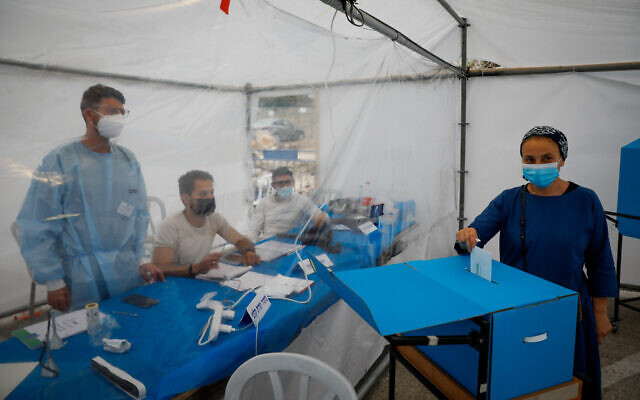As Israel awoke to what looks like another political stalemate after a fourth round of elections in two years provided no clear-cut winner, investors in the Israeli stock exchange shrugged off the news, with shares sliding following cues in the foreign capital markets and not local news.
Based on the almost 90 percent of the votes counted Israel’s Tuesday general election, it appeared that incumbent Prime Minister Benjamin Netanyahu was falling short of a majority to form a coalition government, with the pro-Netanyahu bloc getting a total of 59 seats, compared to 56 for those who have vowed to oust him as premier.
The TA-125 benchmark index was trading 0.6% lower at 12:40 p.m. in Tel Aviv, while the blue-chip TA-35 was 0.4% lower. The shekel was stable at NIS 3.30 to the US dollar.
“The result of the election is not affecting the market,” said David Reznik, capital markets strategist at Bank Leumi Le-Israel Ltd. “There is no clear-cut decision for either side at the moment, and it is more or less the situation we have had in the past two years in this country. With all the sorrow that comes with this, it looks like people have gotten used to the fact that this is how it is here, and believe that in the end things will work out, one way or the other.”

David Reznik, Capital Markets Strategist, at Bank Leumi Le-Israel Ltd. (Courtesy)
The Nasdaq declined 1.12% on Tuesday, while major European markets were also in the red on Wednesday, as continued coronavirus lockdowns in Europe and potential US tax hikes affected the appetite for risk.
The Israeli stock market was lower mainly because of the drops in the US markets on Tuesday and this morning in Asia, Reznik said. Government bond prices in Israel edged higher, similar to the trend in the US on Tuesday, when government bond yields declined.
“Maybe the best barometer that everything is calm in Israel is the shekel, which is stable at around NIS 3.30 to the dollar and is strengthening almost 1% to the euro, following a weakening of the euro globally,” Reznik said. “The market is accepting the situation with equanimity. There is no big drama at the moment.”
It could also be that Israel’s successful, world-leading coronavirus vaccination drive, which promises to get the economy out of its pandemic-induced slumber, is managing to offset the gloom of no clear winner.
“We are opening up and putting the coronavirus behind us, at least at the moment,” Reznik said. “It could be that this is balancing out the election result, and we are seeing stability.”
Israel’s gross domestic product shrank by 2.4 percent in 2020, the first contraction since 2002 and the worst recession ever to hit the nation, but still a far cry from the doom and gloom projections of a 6% or even 7% contraction forecast by economists as the coronavirus hit last year.
Israel started to reopen much of the economy during the past few weeks, as it vaccinated more and more of the population against COVID-19. As of Wednesday morning, some 5.2 million people had been vaccinated with at least one dose and more than 4.6 million with the second dose as well.

People shop at Dizengoff Center in Tel Aviv on February 22, 2021, after it reopened following a few weeks of lockdown. (Miriam Alster/Flash90)
Unemployment in Israel dropped in February from 18% to a still-high 16.7%, and economists are concerned that some of that the jobless rate will translate into a chronic, long-lasting condition. In 2019, before the pandemic struck, unemployment was at a record low of 3.8%.
Creating jobs, setting out a national budget and reining in the budget deficit that ballooned amid the pandemic will be among the most pressing issues any new government will have to tackle, economists say.
Israel has been without a budget for the past two years, as political tensions between Prime Minister Benjamin Netanyahu and his coalition partners, headed by Benny Gantz, prevented the passage of the 2020 and 2021 budgets.
The budget deficit in 2020 soared to some 12% as the government injected funds into the economy to curb the damage wrought by the pandemic, including paying unemployment benefits to workers who were furloughed by their employers.

A woman casts her vote at a polling station for people that is under quarantine because of the Covid-19 in Jerusalem, during the Knesset Elections, on March 23, 2021. (Olivier Fitoussi/Flash90)
Any new government that is formed “will have to make a series of decisions fairly quickly, including some less popular decisions, such as tightening the conditions for receiving the furlough payments, and later on also approving a budget and measures to reduce the deficit,” Bank Hapoalim Ltd. said in a March 21 note, before Tuesday’s election.
The economy is shrugging off immediate political developments and the lack of a budget, focusing instead on developments relating to the virus, wrote David Kohl, chief economist of Swiss wealth management group Julius Baer, in a note on March 21.
“The fourth election in only two years has done very little to destabilize the Israel economy,” said Kohl. “The Corona pandemic and lockdown measures have completely dominated the lack of political stability and the failure to pass a budget has become secondary given the de facto state of health emergency in the past year.”

David Kohl, chief economist of Swiss wealth management group Julius Baer (Courtesy)
“The lack of a budget in Israel is a burden for the longer-term structural economic outlook as it complicates discretionary spending which is necessary to tackle challenges starting from security policy to unfavorable demographic changes,” Kohl told The Times of Israel in a follow-up email on March 23. “These are critical for Israel’s future structural growth. In contrast, the upcoming cyclical economic recovery is expected to be determined more by the mechanics of the pandemic.”
When lockdown measures will become no longer necessary, he added, “the dynamics of the recovery will be largely driven by pent-up demand and less by government policies determined by a budget.”
Julius Baer expects the Israeli economy to expand by 4.5% in 2021, below the forecast European growth of 4.8% and OECD growth of 5.3%, he said, largely due to the fact that both Europe and the OECD saw a much deeper GDP contraction in 2020 than Israel.
Even so, a stable political framework is important for business confidence in Israel, Kohl said.
“Stability of a new government would be certainly a help in order to bring back business confidence, in particular in hard-hit sectors of the economy,” he said. Overcoming the growing polarization in the political scene and the population “would also contribute to a more swift and more sustainable recovery.”
Policies to help hard-hit sectors will most likely be implemented by any future government, he added, “given the general popularity of such policies.”
 RSS Feed
RSS Feed















 March 24th, 2021
March 24th, 2021  Awake Goy
Awake Goy  Posted in
Posted in  Tags:
Tags: 













